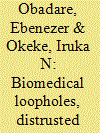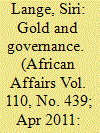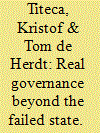|
|
|
Sort Order |
|
|
|
Items / Page
|
|
|
|
|
|
|
| Srl | Item |
| 1 |
ID:
103711


|
|
|
|
|
| Publication |
2011.
|
| Summary/Abstract |
As socio-medical phenomena, epidemics are revealing of the cultures in which they are experienced. The HIV/AIDS epidemic in Africa exposes antecedent tensions between state and society, and, on a broader canvas, between the global north and south. As a contribution to the emerging literature on the social ramifications of HIV/AIDS, this article examines the saga of the Nigerian physician and immunologist, Dr Jeremiah Abalaka, who like other innovators in sub-Saharan Africa claims to have developed a curative HIV vaccine. Whilst articulating the social conditions that enabled Abalaka to thrive, the article explores the marked differences in the reaction to his 'discovery' among state representatives, the scientific establishment, the general public, people living with HIV, and the media. Finally, the article valorizes the emergence of new actors in the African health sector, and the diversity of strategies used by ordinary people to achieve and maintain wellness.
|
|
|
|
|
|
|
|
|
|
|
|
|
|
|
|
| 2 |
ID:
103717


|
|
|
|
|
| Publication |
2011.
|
| Summary/Abstract |
Following advice from the World Bank, and hoping for economic growth and independence from donors, a number of African countries have opened up opportunities for large-scale mining by foreign investors over the last decade and a half. Tanzania, one of the 'new' mining countries, is now among the largest gold producers in Africa, but investor-friendly contracts have resulted in extremely low government revenues from mining, totalling less than 5 percent of what the country receives in development aid. In response to widespread discontent, and acknowledging the plight of affected communities, the government amended the 1998 Mining Act in 2010. However, improved legal provisions may have limited effect if the present governance challenges are not resolved. The article demonstrates that the legal provisions meant to protect the rights of affected people are not followed, and that poorly functioning local democracy is particularly dangerous for pastoralists who are 'represented' by local authorities often dominated by non-pastoralist immigrants. Compensation to smallholder farmers is either non-existent or too low - or the compensation money is embezzled by the authorities entrusted to distribute it.
|
|
|
|
|
|
|
|
|
|
|
|
|
|
|
|
| 3 |
ID:
103715


|
|
|
|
|
| Publication |
2011.
|
| Summary/Abstract |
n the Democratic Republic of Congo (DRC), the state administration has retreated from much of the public domain. The specific case of the education sector - a domain traditionally reserved for the state - shows how public services continue to be provided, and how the Congolese state continues to survive and transform itself. Although no overall power governs the system - there is no overall regulatory authority - this does not mean that the education sector is ungoverned. The state survives as an administrative framework whose role in providing public services has been redefined rather than evaporated. This article describes the organization of the educational system as the direct result of an evolving negotiation process between state and non-state actors. It shows how this negotiated nature of statehood, and the power differentials between the various actors, involve constant renegotiation. Instead of producing uniform results within the education sector, this form of regulation depends on power configurations in particular localities at particular times.
|
|
|
|
|
|
|
|
|
|
|
|
|
|
|
|
| 4 |
ID:
103721


|
|
|
|
|
| Publication |
2011.
|
| Summary/Abstract |
This article examines the United Kingdom's Department for International Development's understanding of the correlations between security and development at the policy level, and contrasts this with on-the-ground experiences in Sierra Leone. Drawing on fieldwork from Sierra Leone, the article shows how DFID policy appears to have taken the correlation between security and development for granted. As the lead international actor implementing Sierra Leone's security sector reform programme, DFID relies upon the validity of the security-development nexus to justify time, money, and expertise spent on issues of security. The relationship between these phenomena is presented as commonsensical and uncontested, but the specific nature of the relationship has been glossed over, with little real empirical evidence to demonstrate nexus claims. In Sierra Leone newfound security has so far failed to produce the anticipated development, suggesting that the causal link between security and development may not be as straightforward as implied. The article concludes that more precise investigations of the manner in which security and development interact in practice are needed.
|
|
|
|
|
|
|
|
|
|
|
|
|
|
|
|
| 5 |
ID:
103719


|
|
|
|
|
| Publication |
2011.
|
| Summary/Abstract |
In Ethiopia, as in other parts of Africa, relations between Christians and Muslims show a new dynamic under the impact of both state policies and global connections. Religious identities are becoming more dominant as people's primary public identity, and more ideological. This development has ramifications for the 'public sphere', where identities of a religious nature are currently presented and contested in a self-consciously polemical fashion. This shared space of national political and civic identity may become more 'fragmented' and thus lend itself to conflict and ideological battle. This article examines recent developments in the polemics of religion in Ethiopia, and the possible role of the state as custodian (or not) of an overarching civic order beyond religion, as well as the emerging rivalries between communities of faith. A crucial question is what social effects these polemics will have on communal relations and patterns of religious coexistence. Polemics between believers have a long history in Ethiopia, but a new and potentially problematic dynamic has emerged which may challenge mainstream believers, their inter-group social relations, and Ethiopian state policy. Polemics in Ethiopia express hegemonic strategies and claims to power, and are rapidly evolving as an ideological phenomenon expanding in public space. The secular state may need to reassert itself more emphatically so as to contain its own erosion in the face of assertive religious challenges.
|
|
|
|
|
|
|
|
|
|
|
|
|
|
|
|
| 6 |
ID:
103710


|
|
|
|
|
| Publication |
2011.
|
| Summary/Abstract |
This article traces how African incomes have been measured through history, and shows that there has been a conflict of aims between producers and users of national income estimates. Politicians and international organizations seek income measures that reflect current political and economic priorities and achievements. Thus the importance given to markets, the state, and peasants in the estimates varies through time and space. Meanwhile statisticians aim to produce a measure that gives the best possible reflection of the economy given the available data and definitions at any time. Scholars prefer a measure that is consistent through time and space so that 'progress' can be measured, compared, and analysed, while not being able to reach consensus on how 'progress' is best calculated or defined. The result is not an objective measure of progress, but rather an expression of development priorities determined by changes in the political economy. The article provides a much-needed study of the ability of the statistical offices to provide income statistics independently and regularly. These data are of crucial importance as they enter the public domain in policy evaluations, political debates, and progress towards lofty aims such as the Millennium Development Goals.
|
|
|
|
|
|
|
|
|
|
|
|
|
|
|
|
|
|
|
|
|